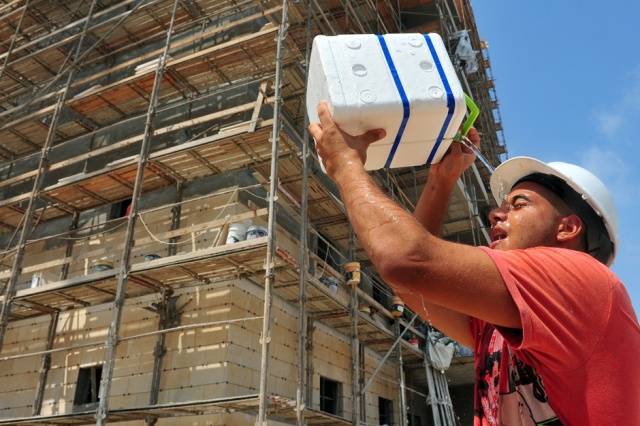Met Office
|
|
‘Fusing’ the best of UK science to build resilience to high-impact weather events and climate change
An urgent need to understand the increasing impacts of extreme weather and climate change and how these affect society is the focus of an expanded Met Office initiative which is developing deeper partnerships with key British universities.
The Met Office Academic Partnership (MOAP) is fusing the research excellence of the Met Office and leading UK universities through a formal collaboration to advance the science and skill of weather and climate prediction.
The partnership will embrace the challenges set out in the Met Office’s newly refreshed Research and Innovation strategy.
Temperature extremes are expected to increase in line with climate change, bringing potential impacts on health. Here a construction worker in Israel takes a cooling break during a heatwave event. Picture: Shutterstock
Dr George Pankiewicz is the Met Office Head of Science Partnership who jointly oversees the partnership. Commenting on the future of MOAP, he said:
“Tackling the challenges of high-impact weather and climate can no longer be treated as a single discipline as it increasingly requires involvement from scientists in other sectors including health, technology, artificial intelligence, and the social sciences.
“So, we are developing our academic partnership to bring together the best of UK scientific research. By working with other centres of expertise we can cover topics where the Met Office doesn’t necessarily have an acknowledged expertise.
“A good topical example of how this program is expected to make great advances is in the sphere of heat health. This summer we saw temperature records being broken across the UK. But around the northern hemisphere there were also multiple heatwave events, bringing disruption and societal impacts to many communities.
“The increasing frequency and intensity of heat events is something that humanity will have to increasingly adapt to. Scientists at the Met Office and elsewhere are building the body of research about these events, but we recognise that isn’t sufficient alone to help society rise to future challenges.”
Dr Verity Payne, who is the Met Office’s UK Science Partnership Manager, also jointly oversees the partnership. She added:
“We also need to work with scientists specialising in health and social sciences to understand more about the high-temperature impacts on society, including heat stress and mortality, and to find the best ways of mitigating the worst impacts.
“This will involve integrating lots of different sets of information and data into climate models, aided by the development of novel supercomputers providing more power. Scientists with specialisms in artificial intelligence and machine learning can, in turn, discover profound new ways of analysing data and improving insights.
“The wider the sphere of expertise we can draw upon, the more sophisticated societal response can become.”
A key partner in the delivery of the heat health aspect is Bristol University. Professor Dann Mitchell is the joint MOAP chair at Bristol University, where his role will seek to involve all levels of the university. He said:
“The impacts of higher temperatures on health are numerous and often feedback on each other in negative ways. They range from immediate impacts, such as direct temperature stress on humans, animals, and ecosystems, to longer-term factors such as decreased cognitive health from persistent exposure to decades of hotter nights.
“To calculate the full health burden of increasing heat on society it is important to carry out research blending traditional climate and weather science with different disciplines such as health science, town planning, and social responses to emergencies.
“Blending these strands together and fusing them into new research is one of the reasons why I am so excited about the momentum and real-world solutions that the academic partnership brings.”
Professor Stephen Belcher is the Met Office Chief Scientist. He concluded: “Extreme weather events and climate change pose among the greatest risks facing humanity. Tackling them is an urgent and huge undertaking. The Met Office can’t do it alone – the Met Office Academic Partnership harnesses the best of UK research and will give us the best chance of coping with and adapting to future change.”
Original article link: https://blog.metoffice.gov.uk/




